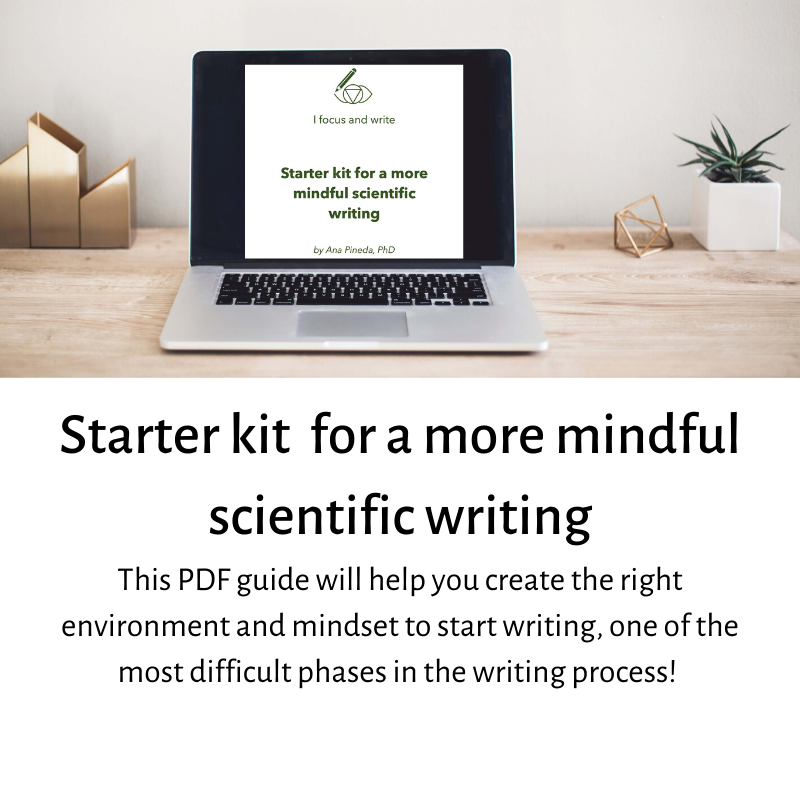In which section should you start writing your scientific paper?
- Ana Pineda
- Sep 21, 2021
- 4 min read
Updated: Feb 4
This is one of the questions you see people often asking on Twitter. It’s a question that the scientists who take our writing course often ask me. And it’s a question I wondered with every paper I wrote.
The answer is: it depends.
And you may hate this answer! But let me explain to you why to help you decide for yourself!
But before we continue, I want you to know there’s no right place to start. So don’t be surprised if the advice I give you here contradicts what you’ve heard so far. As always, my recommendation is to try it, and see what works for you!
Here’s one of the things you may have heard:
Option A: Start writing your scientific paper with the results section
Some people will tell you to start writing your scientific paper with the results section. To start analyzing your results, making figures and selecting the ones that will go inside the article. Then perhaps even write the results section, and build up from there.
That’s a great way if you’re writing your paper once you’ve got your results. But…
I don’t agree with this advice for one simple reason: I want you to start writing your paper before having your results. Actually, write before you even start doing your experiments.
You may be wondering...how??? Some of the common objections I hear are “I don't have my results yet” or “I need to read more papers before I start writing”. If that’s you, no worries, it’s super common.
These are limiting beliefs. Beliefs that are keeping you safe from starting something that you may find a bit scary. Perhaps it’s your first paper and you feel you don’t have the skills to write it (you can read this post on how to get better at writing). Or perhaps you have experience, but you want to do it perfectly and not get all the negative feedback or even the rejection from the journal. Whatever your situation is, this is human.
So, what to do instead?
Option B: Start writing your scientific paper now (whatever section!)
In fact, start right after you finish reading this blog post. Better yet, right after downloading this starter kit for more mindful scientific writing :)
It doesn’t really matter what you’re writing, as long as you’re doing it. But don’t delay your writing any longer.
The reason is that when you write, you’re getting 2 types of results:
Growing skilled in the craft of writing. The process of putting ideas into words and those words onto paper. It’s a process that requires both mental and emotional effort, but that also brings you closer to those writing skills we all wish we’d have. The good thing is that the content of what you write doesn’t matter. You can write emails, love letters, or a drafty draft of what your paper will be. Just write, ideally every day.
Advancing your manuscript. This is the clearest result and the one we’re after. Writing an introduction, a results section... Ideally, as close to the final version as possible. But keep in mind that it’s not the only result.
At this point, you might be wondering, ok, but where should I specifically start writing my scientific paper? Here it comes...

Option C: If you struggle with starting a paper, then write the Materials and Methods section first
This is the first answer given by Dr. Google when you ask, “which section of a scientific paper should I write first?” pointing to this article on “How to write your first research paper” by Elena Kalestinova. And I support this.
Why? Because it’s quite straightforward; it’s an easy section that you can get inspired for by reading other papers with similar methods. A section where you know everything because it’s what you’re going to do.
You can write this section already before doing your experiments! And I highly recommend you do that because you can spot if there are any mistakes in your experimental design. You can also be sure that the experiments you’re planning to do are the right ones to answer your research questions.
Option D: If you’re a starter (full of energy at the beginning), then start writing your scientific paper’s introduction.
And to be more precise, with the last paragraph of the introduction. There you’ll have your general objective, the novelty, and the research questions of your study. And having this clear will make your life easier when you need to write the rest of the paper.
For example, the introduction should contain the information the reader needs to understand those research questions. And the results could be organized into sections, each section for a research question.
Again… you can even start writing your scientific paper’s full introduction before doing your experiments! You’ll probably edit it later, but at least you already have an important piece of text with different ideas and referenced literature.
The important truth about where to start writing your scientific paper
Let me emphasize it once more… it doesn’t matter that much which section you start with. What matters is that you start writing now. You’ll always have time to edit and re-organize your text later. And please, remember that taking into consideration how you are (for example, a starter or a finisher) and how you feel mentally and emotionally can help you decide which section to start with.
If you don’t have it yet, I highly recommend you have a look at the starter kit for more mindful scientific writing. It’s a free pdf guide, and you can just download it here!
And I’d love to leave you with a Chinese proverb:
“The best time to plant a tree was 20 years ago. The second best time is now.”
It’s never too late to start!
Happy writing!
Ana





